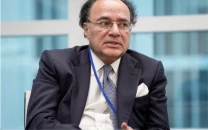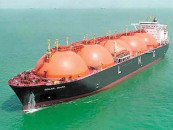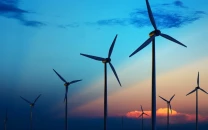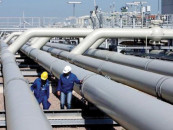Govt targets offshore drilling with new partners
Pakistani firms to team up with Turkiye, Russian companies for oil, gas exploration

Pakistan has decided to again try its luck in offshore drilling by forging new partnerships with countries like Turkiye and Russia.
Earlier, domestic companies including Oil and Gas Development Company Limited (OGDCL) and Pakistan Petroleum Limited (PPL) struggled to find hydrocarbon reserves in an offshore zone in Arabian Sea in association with US energy giant ExxonMobil and Italian firm Eni. Pakistan has made 17 attempts to make offshore drilling but they did not yield desired results.
They drilled the Kekra-1 offshore well during tenure of the previous Pakistan Tehreek-e-Insaf (PTI) government. But those efforts did not bring success. The Kekra-1 offshore well is located approximately 280 kilometres off Karachi coast.
Sources told The Express Tribune that the Petroleum Division was seeking bids from interested investors to grant rights for drilling an offshore well and it would open the bids on October 31, 2025.
Petroleum Minister Ali Pervaiz Malik and OGDCL Managing Director Ahmed Hayat Lak are also looking to bring some new partners to Pakistan for offshore drilling.
They visited Russia recently and invited its companies to pump investment into Pakistan's offshore drilling sector and participate in the upcoming bidding round.
OGDCL has already formed a joint venture with a Turkish firm for submitting an offer for offshore drilling. In this case, bids are scheduled to be opened on October 13.
Sources said that Russian firms were also likely to enter into a joint venture with OGDCL through bidding for an offshore block.
Earlier, Pakistani firms had a joint venture with Italian and US firms. "This time around, Islamabad is going to try its luck in offshore drilling with new partners," an official remarked.
In February 2025, the government announced an offshore block bidding round, offering 40 blocks in Makran and Indus basins for exploration licences. This is a significant opportunity that could attract foreign direct investment (FDI) in the upstream energy sector.
Pakistani exploration and production (E&P) companies – Mari Energies, OGDCL and PPL — have signed a joint bidding agreement with Turkish state-owned firm Turkiye Petrolleri Anonim Ortakligi. Under this deal, they will participate in the offshore bidding round.
Pakistan believes that this strategic collaboration will bring much-needed FDI and pave the way for deployment of international technologies, expertise and skills to explore the untapped potential of the country's offshore region.
Previously, an offshore drilling venture was formed with US energy major ExxonMobil following a nine-year hiatus. However, it turned out to be unsuccessful, with allegations of lack of commitment against ExxonMobil.
ExxonMobil was also said to have placed a request for a larger exploration area in Karachi's seawaters, but security concerns prevented the government from accepting the request.
Now, the Shehbaz Sharif-led government is striving to accelerate oil and gas exploration activities in the country. Circular debt is a key challenge, with growing calls from E&P firms to resolve this issue. They argue that the circular debt has squeezed their cash flow, restricting them from injecting money into new projects.
At present, the gas sector is facing a circular debt of Rs2.8 trillion and the Petroleum Division is making efforts to settle these liabilities.
Separately, liquefied natural gas (LNG) supply contracts with Qatar have led to a decrease in indigenous gas supply, compounding financial problems for energy firms.
Tax and advisory services provider KPMG, hired by the Petroleum Division, has drawn up proposals to tackle the circular debt problem.
It has recommended the government to impose a special levy in the range of Rs3 to Rs10 in line with the power sector model, where debt servicing surcharge has been included in consumer bills. The special levy will help raise funds for debt servicing through bank loans, which will be gradually retired over six to seven years.
Additionally, the advisory firm has proposed an increase in gas prices and a gradual end to the cross-subsidy of Rs160 billion by January 2027.




















COMMENTS
Comments are moderated and generally will be posted if they are on-topic and not abusive.
For more information, please see our Comments FAQ